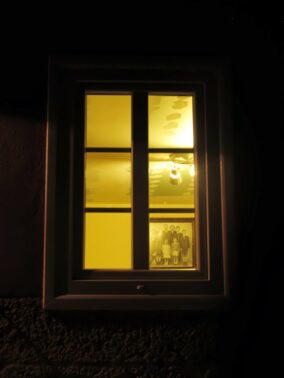La mano en la tierra. Earth poetry workshop, faladoiro, with Luz Pichel

Falar é cousa linda. Hai faladeiras, faladoiros, falaropos, falaropo bico ghroso, bico fino, tricolor, etc.
TU EXISTE, Luz Pichel, 2024.
In the thick stone walls of traditional Galician houses, the two stone pots in the window are called faladoiros. They are places to sit and talk, quietly, in search of a little clarity. Faladeira is a good place to talk. Falaropo is a bird with a thin or thick beak. Bico means beak and kiss.
On the 9th and 10th of April we celebrate La mano en la tierra (The hand in the earth). Earth poetry workshop, faladoiro with Luz Pichel as part of OLLA. Common research programme. La mano en la tierra is not only a verse, it is also a gesture, an inclination of the body that lovingly wants to recognise or discover, to be surprised by the small, the larva, the worm or the seed. Little beetle. Shaking hands with others, like potatoes in their rhizomatic alliance. Conversation. We will read texts that have in common the use of waste, of the worthless. Or the lace of the broken and the splinter, the fraction. Cachelos is the Galician word for the piece that has been broken off. A terrestrial poetry will probably be that which is not divine. Desacralisation. De-hierarchisation. Thinking together, listening, creating threads with which to weave something that lasts, or tools with which to unweave what was considered worthless.
9 April
1. Reading and discussion of the book ALÉN ALÉN, Luz Pichel, La uña rota, 2021
10 April
Reading of excerpts from the following books:
– Jarrón y tempestad, Guadalupe Grande, La uña rota, 2023,
– Pornografía, Lupe Gómez, edition by the author, 1995, in translation by Luz Pichel, La uña rota, 2018.
– My life, Lyn Hejinian, 1980, in Spanish translation by Pilar Vázquez and Esteban Pujals, Acto ediciones, 2011.
2. Writing practice with Lyn Hejinian.
Practical information
Days: 9 and 10 April
Time: 9 April from 4 p.m. to 7 p.m. and 10 April from 10 a.m. to 1 p.m. (approximate end time).
Venue: Former offices, Hangar
Fully booked
Luz Pichel is a poet. She was born in Alén, Pontevedra, in 1947. Alén means “beyond”, and it also means “the beyond”. There she learned to speak in a language that could die but she doesn’t want to. Those who speak that language think that it is always others who speak it well.
The tension between major and minor languages, the liberating potential of a non-stabilized or non-folklorizing use of the dialect, the class conflict that the castrapo leaves visible, memory and childhood and the crack of invention that both open, are some of the avenues that his poetry explores.
She is the author of the poetry books El pájaro mudo (Ediciones La Palma, 1990; I Poetry Prize “Ciudad de Santa Cruz de la Palma”); La marca de los potros (Huelva Provincial Council, 2004; XXIV Juan Ramón Jiménez Hispanic American Poetry Prize); Casa Pechada (Caixa Galicia Foundation, 2006, XXVI Esquío Poetry Prize); El pájaro mudo y otros poemas (Universidad Popular José Hierro, 2004. This book brings together the reissue of her first collection of poems along with new works such asÁngulo de la niebla, Cartas de la mujer insomne y Hablo con quien quiero). In 2013 she published cativa en su lughar / casa pechada (Col. divinos salvamentos, ed. Progresele, Madrid); in 2015, tra(n)shumancias (Col. eme, ed. La Palma, Madrid; CO CO CO U, La uÑa RoTa, 2017; DIN DIN DON Y MORE HORTENSIAS AZULES, Cartonera del Escorpión Azul, 2021, ALÉN ALÉN, La uÑa RoTa, 2021, and TU EXISTE, La uÑa RoTa, 2023.
Supported by:
![]()
Categories: Agenda Hangar | Tags: olla
